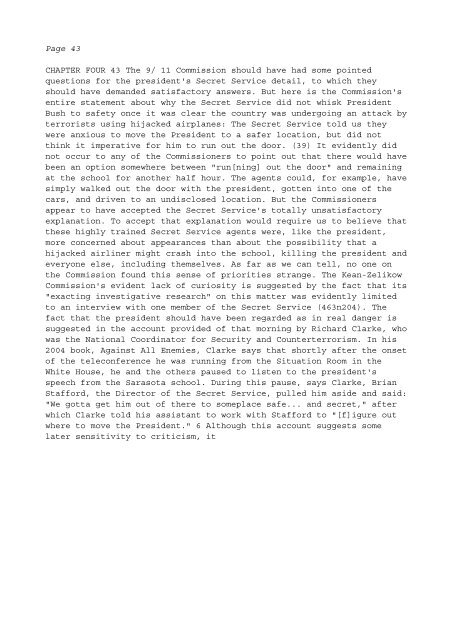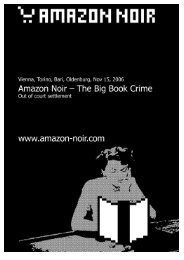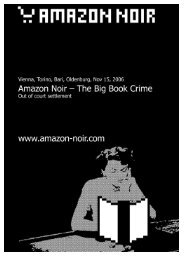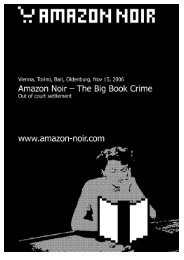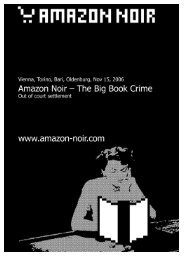- Page 2: The 9 11 Commission Report Omission
- Page 5 and 6: Page 2
- Page 7 and 8: Page 4
- Page 9 and 10: Page 6
- Page 11 and 12: Page 8
- Page 13 and 14: Page 10
- Page 15 and 16: Page 12
- Page 17 and 18: Page 14
- Page 19 and 20: Page 16
- Page 21 and 22: Page 18
- Page 23 and 24: Page 20 THE 9/11 COMMISSION REPORT:
- Page 25 and 26: Page 22 2 THE 9/11 COMMISSION REPOR
- Page 27 and 28: Page 23 CHAPTER ONE 23 have any pub
- Page 29 and 30: Page 25 CHAPTER Two The Collapse of
- Page 31 and 32: Page 27 CHAPTER TWO 27 7. Most of t
- Page 33 and 34: Page 29 CHAPTER Iwo 29 collapse of
- Page 35 and 36: Page 31 CHAPTER TWO 31 in the Twin
- Page 37 and 38: Page 33 CHAPTER THREE The Strike on
- Page 39 and 40: Page 35 CHAPTER THREE 35 one would
- Page 41 and 42: Page 37 220 THE 9/11 COMMISSION REP
- Page 43 and 44: Page 39 CHANTER THREE 39 the respon
- Page 45: Page 41 CHAPTER FOUR The Behavior o
- Page 49 and 50: Page 45 air traffic.1e fact that ai
- Page 51 and 52: Page 47 CHAPTER FOUR 47 "The only d
- Page 53 and 54: Page 49 CHAPTER FIVE Advance Inform
- Page 55 and 56: Page 51 CHAPTER FIVE 51 commercial
- Page 57 and 58: Page 53 CHAPTER FIVE 53 of the stoc
- Page 59 and 60: Page 55 CHAPTER FIVE 55 That is, le
- Page 61 and 62: Page 57 CHAPTER FIVE 57 have been w
- Page 63 and 64: Page 59 CHAPTER SIX Osama, the bin
- Page 65 and 66: Page 61 CHAPTER SIX 61 Laden is the
- Page 67 and 68: Page 63 (HAPrER six 63 But on June
- Page 69 and 70: Page 65 CHAPTER SIX 65 basis for de
- Page 71 and 72: evidence than the report suggested.
- Page 73 and 74: Page 68 THE 9/11 COMMISSION REPORT:
- Page 75 and 76: Page 70 THE 9/11 COMMISSION REPORT:
- Page 77 and 78: Page 72 THE 9/11 COMMISSION REPORT.
- Page 79 and 80: Page 74 THE 9/11 COMMISSION REPORT:
- Page 81 and 82: Page 76
- Page 83 and 84: Page 78 THE 9/11 COMMISSION REPORT:
- Page 85 and 86: Page 80 116 THE 9/11 COMMISSION REP
- Page 87 and 88: Page 82 THE 9/11 COMMISSION REPORT:
- Page 89 and 90: Page 84 THE 9/11 COMMISSION REPORT:
- Page 91 and 92: Page 86 THE 9/11 COMMISSION REPORT:
- Page 93 and 94: Page 88
- Page 95 and 96: Page 90 THE 9/11 COMMISSION REPORT:
- Page 97 and 98:
Page 92 a search warrant for his co
- Page 99 and 100:
Page 94 THE 9/11 COMMISSION REPORT:
- Page 101 and 102:
Page 96 the most obvious questions
- Page 103 and 104:
Page 98 report in the Chicago Tribu
- Page 105 and 106:
Page 100 11111 THE 9/11 ( OMMISSION
- Page 107 and 108:
Page 102
- Page 109 and 110:
Page 104 THE 9/11 COMMISSION REPORT
- Page 111 and 112:
Page 106 THE 9/11 COMMISSION REPORT
- Page 113 and 114:
Page 108 THE 9/11 COMMISSION REPORT
- Page 115 and 116:
Page 110 1111 THE 9/11 COMMISSION R
- Page 117 and 118:
Page 112 11 2 THE 9/11 COMMISSION I
- Page 119 and 120:
Page 114 THE 9/11 COMMISSION REPORT
- Page 121 and 122:
Page 116
- Page 123 and 124:
Page 118 THE 9/11 COMMISSION REPORT
- Page 125 and 126:
Page 120 deter the United States fr
- Page 127 and 128:
Page 122 of the US Space Command, w
- Page 129 and 130:
Page 124 THE 9/11 COMMISSION REPORT
- Page 131 and 132:
Page 126 the United States would tr
- Page 133 and 134:
Page 128 12S THE. 9/11 COMMISSION K
- Page 135 and 136:
Page 130 THE 9/11 COMMISSION REPORT
- Page 137 and 138:
Page 132 THE 9/11 COMMISSION REPORT
- Page 139 and 140:
Page 134 THE 9/11 COMMISSION REPORT
- Page 141 and 142:
Page 136
- Page 143 and 144:
Page 138
- Page 145 and 146:
Page 140 forward requests for DoD [
- Page 147 and 148:
Page 142 in one of the staff report
- Page 149 and 150:
Page 144 THE 9/11 COMMISSION KEVOKf
- Page 151 and 152:
Page 146 THE 9/11 COMMISSION REPORT
- Page 153 and 154:
Page 148 THE 9/11 COMMISSION REPORT
- Page 155 and 156:
Page 150 THE 9/11 COMMISSION REPORT
- Page 157 and 158:
Page 152 THE 9/11 COMMISSION REPORT
- Page 159 and 160:
Page 154
- Page 161 and 162:
Page 156 THE 9/11 COMMISSION REPORT
- Page 163 and 164:
Page 158 someone to scramble some F
- Page 165 and 166:
Page 160 THE 9/11 COMMISSION REPORT
- Page 167 and 168:
Page 162 THE 9/11 COMMISSION REPORT
- Page 169 and 170:
Page 164 THE 9/11 COMMISSION REPORT
- Page 171 and 172:
Page 166 THE 9/11 COMMISSION REPORT
- Page 173 and 174:
Page 168 '1 HE 9/11 COMMISSION REPO
- Page 175 and 176:
Page 170 THE 9/11 COMMISSION REPORT
- Page 177 and 178:
Page 172 I72 THE 9/11 COMMISSION RE
- Page 179 and 180:
Page 174 1 74 THE 9/11 COMMISSION R
- Page 181 and 182:
Page 176 THE 9/11 COMMISSION REPORT
- Page 183 and 184:
Page 178 THE 9/11 COMMISSION REPORT
- Page 185 and 186:
Page 180 1$1) THE 9/11 COMMISSION R
- Page 187 and 188:
Page 182 believe the Kean-Zelikow C
- Page 189 and 190:
Page 184 THE 9/11 COMMISSION REPORT
- Page 191 and 192:
Page 186 THE 9/11 COMMISSION REPORT
- Page 193 and 194:
Page 188 THE 9/11 COMMISSION REPORT
- Page 195 and 196:
Page 190 THE 9/11 COMMISSION REPORT
- Page 197 and 198:
Page 192 1 HE 1) 1 1 (,.OMMISSIO~N
- Page 199 and 200:
Page 194 THE 9/11 COMMISSION REI'OK
- Page 201 and 202:
Page 196 THE 9/11 COMMISSION REPORT
- Page 203 and 204:
Page 198 THE 9/11 COMMISSION REPORT
- Page 205 and 206:
Page 200 incorrect. The notice NEAD
- Page 207 and 208:
Page 202 THE 9/11 COMMISSION REPORT
- Page 209 and 210:
Page 204 THE 9/11 COMMISSION REPORT
- Page 211 and 212:
Page 206 THE 9/11 COMMISSION REPOR1
- Page 213 and 214:
Page 208 THE 9/11 COMMISSION KEI'OI
- Page 215 and 216:
Page 210 THE 9/11 COMMISSION REPORT
- Page 217 and 218:
Page 212 the even more extreme clai
- Page 219 and 220:
Page 214 THE 9/11 COMMISSION REPORT
- Page 221 and 222:
Page 216 CHAPTER FOUKTEEN 219 Rumsf
- Page 223 and 224:
Page 218 THE 9/11 COMMISSION REPORT
- Page 225 and 226:
Page 220
- Page 227 and 228:
Page 222
- Page 229 and 230:
Page 224 HE `Ji 1 1 CUMMISSIUN REPO
- Page 231 and 232:
Page 226 THE 9/11 COMMISSION REPORT
- Page 233 and 234:
Page 228 THE 9/11 COMMISSION REPORT
- Page 235 and 236:
Page 230 THE 9/11 COMMISSION REPORT
- Page 237 and 238:
Page 232
- Page 239 and 240:
Page 234 THE 9/11 COMMISSION REPORT
- Page 241 and 242:
Page 236 THE 9/11 COMMISSION REPORT
- Page 243 and 244:
Page 238 THE. 9/11 COMMISSION REPOR
- Page 245 and 246:
Page 240 241) lHE 9i 1 1 COMMISSION
- Page 247 and 248:
Page 242 THE 9/11 COMMISSION REPORT
- Page 249 and 250:
Page 244 THE 9/11 COMMISSION REPORT
- Page 251 and 252:
Page 246 THE 9/11 COMMISSION REI'OK
- Page 253 and 254:
Page 248 THE 9/11 COMMISSION REPORT
- Page 255 and 256:
Page 250 THE 9/11 COMMISSION REPORT
- Page 257 and 258:
Page 252 A few minutes later, Chene
- Page 259 and 260:
Page 254 THE 9/11 COMMISSION REPORT
- Page 261 and 262:
Page 256 2001. The Commission also,
- Page 263 and 264:
Page 258 THE 9/11 COMMISSION REPORT
- Page 265 and 266:
Page 260 THE 9/11 COMMISSION REPORT
- Page 267 and 268:
Page 262 THE 9/11 COMMISSION REPORT
- Page 269 and 270:
Page 264 THE 9/11 COMMISSION REPORT
- Page 271 and 272:
Page 266 2(,6 THE 9/11 COMMISSION R
- Page 273 and 274:
Page 268 THE 9/11 COMMISSION REPORT
- Page 275 and 276:
Page 270 THE 9/11 COMMISSION REPORT
- Page 277 and 278:
Page 272 that day had ever dealt wi
- Page 279 and 280:
Page 274 [T]here was a briefing at
- Page 281 and 282:
Page 276
- Page 283 and 284:
Page 278 THE 9/11 COMMISSION REPORT
- Page 285 and 286:
Page 280 signed this letter, which
- Page 287 and 288:
Page 282 THE 9/11 COMMISSION REPORT
- Page 289 and 290:
Page 284 THE 9/11 COMMISSION REPORT
- Page 291 and 292:
Page 286 THE 9/11 COMMISSION REPORT
- Page 293 and 294:
Page 288 _riK 111[ V~ j j (((MMISSI
- Page 295 and 296:
Page 290 THE 9/11 COMMISSION REPORT
- Page 297 and 298:
From Index Page 1 336 1F-IE 9/11 CO
- Page 299 and 300:
From Index Page 3 34 THE 9/11 COMMI
- Page 301 and 302:
From Index Page 5 INDEX OF NAMES 33
- Page 303 and 304:
Back Matter Page 2 94 THE 9/11 COMM
- Page 305 and 306:
Back Matter Page 4 the National Com
- Page 307 and 308:
Back Matter Page 6 2001 (http://new
- Page 309 and 310:
Back Matter Page 8 300 THE 9/11 COM
- Page 311 and 312:
Back Matter Page 10 24 "WTC-7 Implo
- Page 313 and 314:
Back Matter Page 12 NOTES TO CHAPTE
- Page 315 and 316:
Back Matter Page 14 Trace ISI-Terro
- Page 317 and 318:
Back Matter Page 16 ( IAI'lEk 1E6fI
- Page 319 and 320:
Back Matter Page 18 NOTES TO CHAPTE
- Page 321 and 322:
Back Matter Page 20 Wald's New York
- Page 323 and 324:
Back Matter Page 22 NOTES TO CHAPTE
- Page 325 and 326:
Back Matter Page 24 NOTES TO CHAPTE
- Page 327 and 328:
Back Matter Page 26 27, 2002. CBS N
- Page 329 and 330:
Back Matter Page 28 322 THE 9/11 CO
- Page 331 and 332:
Back Matter Page 30 332 THE 9/11 CO
- Page 333 and 334:
Back Matter Page 31 National Commis
- Page 335 and 336:
Back Matter Page 33 reassumed his d
- Page 337 and 338:
Back Matter Page 35 331) THE 9/11 C
- Page 339 and 340:
Back Matter Page 37 NOTES TO THE IN
- Page 341 and 342:
Back Matter Page 49 NOTES TO CHAPTE
- Page 343 and 344:
Back Matter Page 51 CNN, September
- Page 345 and 346:
Back Matter Page 53 298 THE 9/11 CO
- Page 347 and 348:
Back Matter Page 55 314 THE 9/11 CO
- Page 349 and 350:
Back Matter Page 57 "Open Letter: N
- Page 351 and 352:
Back Matter Page 59 NOTES TO THE CO
- Page 353 and 354:
Back Matter Page 61 11 COMMIS~IC~h
- Page 355 and 356:
Back Matter Page 104 NOTES TO CHAPT
- Page 357 and 358:
Back Matter Page 106 318 THE 9/11 C
- Page 359 and 360:
Back Matter Page 108 Life, 2002), 1
- Page 361 and 362:
Back Matter Page 110 320 111F V/ 1
- Page 363 and 364:
Back Matter Page 153 3(16 THE 9/11
- Page 365 and 366:
Back Matter Page 155 NOTES TO CHAPT
- Page 367 and 368:
Back Matter Page 157 ;26 THE 9/11 C
- Page 369 and 370:
Back Matter Page 159 294 THE 9/11 C
- Page 371 and 372:
Back Matter Page 200 302 THE 9/11 C
- Page 373 and 374:
Back Matter Page 202 NOTES TO ( HAP
- Page 375 and 376:
Front Matter Page 2 ACKNOWLEDGMENTS
- Page 377 and 378:
Front Matter Page 4 2 THE 9/11 COMM
- Page 379 and 380:
Front Matter Page 6 4 THE 9/11 COMM
- Page 381 and 382:
Front Matter Page 8 6 THE 9/11 COMM
- Page 383 and 384:
Front Matter Page 10 8 THE 9/11 COM
- Page 385 and 386:
Front Matter Page 12 10 THE 9/11 CO
- Page 387 and 388:
Front Matter Page 14 12 THE 9/11 CO
- Page 389 and 390:
Front Matter Page 16 INTRODUCTION 1
- Page 391 and 392:
Front Matter Page 18 is even better
- Page 393 and 394:
Front Matter Page 20 INTRODUCTION J
- Page 395 and 396:
Front Matter Page 22 14 THE 9/11 CO
- Page 397 and 398:
Front Matter Page 24 basic theories
- Page 399:
Copyright Page 1 First published in


